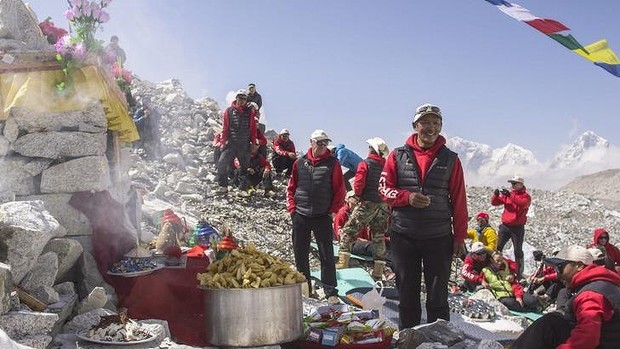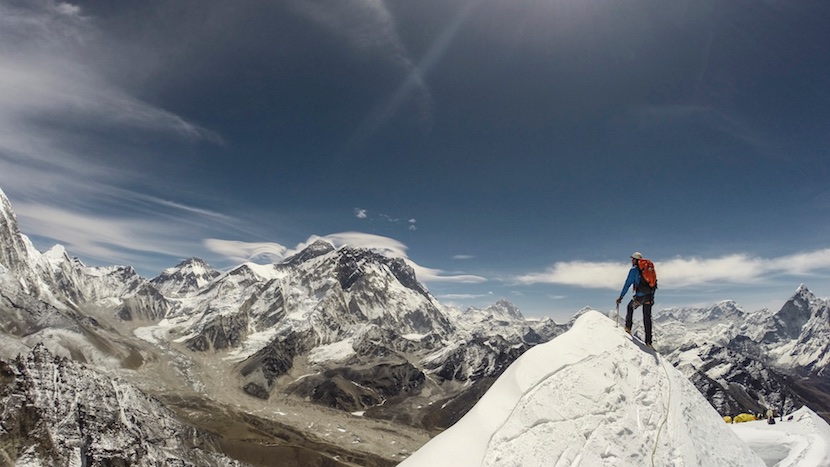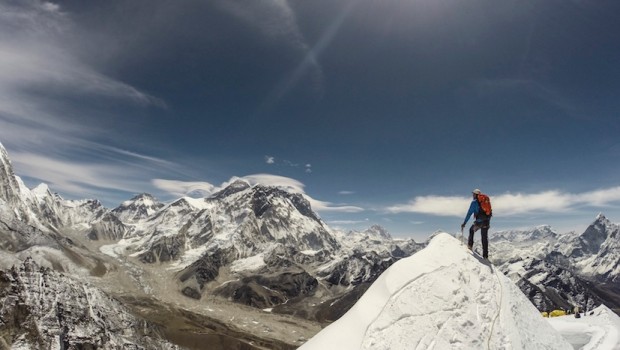Sherpa – Film Review
Reviewed by Curtis Mayfield M-H on the 15th of March 2016
Transmission Films presents a film by Jennifer Peedom
Written by Jennifer Peedom
Produced by Jennifer Peedom, Bridget Ikin & John Smithson
Starring: Phurba Tashi, Russell Brice & Ed Douglas
Music by Antony Partos
Cinematography: Renan Ozturk & High Miller
Edited by Christian Gazal
Running Time: 96 minutes
Rating: M
Release Date: the 31st of March 2016
Sherpa is the upcoming documentary film that is beautifully shot but doesn’t shy away from the ugly truths. Filmed at the famed base camp of the near impossible Mt. Everest climb, Sherpa shines a light on the unsung heroes of this famous ascent. News of the fabled climb has been getting a lot of attention over the last few years but not for the traditional reasons. Back in 2012, there were the reports of hundreds of tourists overcrowding the paths up to the summit and even scenes of violence and hostility between overzealous tourists and the local Sherpa guides. Australian filmmaker Jennifer Peedom has taken on the politics between guides and tourists from the west and the people who have lived near the mountain for generations. With initial intentions of making the film about a female Sherpa’s first ascent to the top of the legendary mountain while guiding a group of western tourists, a terrible avalanche changed the story’s course. After this tragic event the scope lands and stays on Phurba Tashi, a Sherpa who is attempting his 22nd climb to the top. However, Tashi doesn’t do this climb for fun like the tourists who are spending thousands of dollars. Tashi, like all of the other Sherpa guides in Nepal, does it to provide for his family during this window of a money-making opportunity that only comes around once a year due to seasonal changes. From the go, Sherpa becomes an extremely touching story as we’re introduced to Tashi’s family who, much like the other families of Mt. Everest guides, show their worry that one day their loved ones won’t come down off the mountain.
And this is one of the topics Peedom’s documentary explores. Not about why these thrill seeking tourists jump at the chance to do the life-threatening climb but the ones who do it to survive. This may sound like an oxymoron but if you watch Sherpa you’ll begin to realise that the Nepalese who are taking this risk to provide for their families don’t have much choice as they earn nearly a year’s worth of salary in one trip. Another aspect that the film looks into is the debunking of the clichéd image of the smiling, obedient Sherpa. After the death of 16 guides, the traditional people of the land holdup any other attempts to climb the mountain in an effort to pay respect to the dead as well as protest so the government will provide more benefits to the guiding industry. As we watch tourists literally have a sulk about what’s happening, it’s not hard to sympathise with the Nepalese, especially when we hear one boisterous American accent ask why can’t the “owners” of the protesting guides make them stand down.

The film is packed with not only picturesque scenery but also features a great ‘cast’ of characters. There’s the hero of the story Phurba Tashi, who is a very dignified person with his quiet demeanor saying more than a million words could. Veteran New Zealand mountain climber Russell Brice features heavily in this story that eventually becomes a debate of who has authority over the mountain and its path. Brice plays somewhat of a peacekeeper as he struggles to keep both the tourists and Sherpas happy. Then there’s the voice of reason and semi-narrator of the film, travel writer and journalist Ed Douglas, who’s voice is so easy to listen to you almost forget you’re watching a film that deals with some tough issues. There are even interviews with the children of Tenzing Norgay, who was a major part of the first expedition to Mt. Everest. Norgay was celebrated internationally as a true mountaineering icon but wasn’t given the same accolades as his western counterpart Sir Edmund Hillary.

Sherpa is a film that features scenes so breathtaking you’ll feel like you’re at the altitude where they’re filming. The film goes past being an IMAX experience as it delves right into the political and social issues of the marginalised Sherpa people, while also being a big middle-finger to the government that makes millions off of the life threatening work people just like Phurba Tashi do, without proper compensation or benefits. Sherpa is such an education that it deserves to charge its own tuition fee. Don’t feel embarrassed if you feel a wet sensation running down your face while you watch this. That’s just the unavoidable emotion of sadness you’ll feel while watching these amazingly resilient people do what they have to do to survive as well as keep their culture and tradition alive in a world where globilisation and ‘glamping’ become more and more common. Sherpa provides a balanced argument about the issues of respecting cultures while telling the story of these secondary characters who don’t, until now, get their credit in these world famous stories of beating the odds and making it to the top.
Summary: Sherpa is a film that features scenes so breathtaking you’ll feel like you’re at the altitude where they’re filming.







